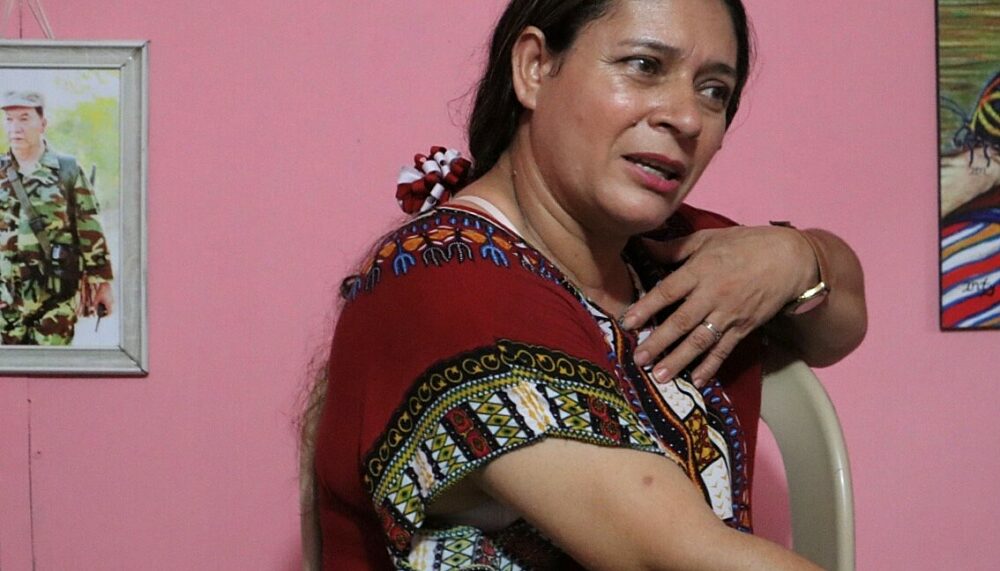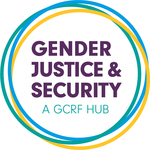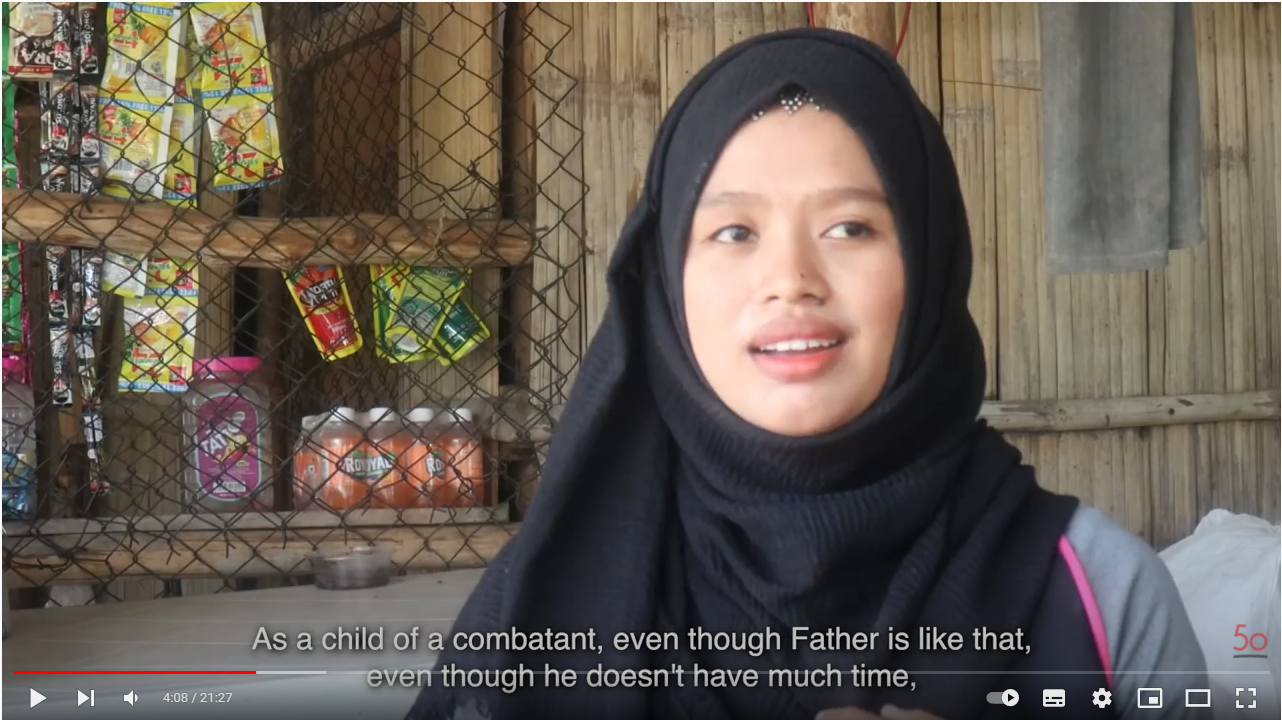PAST PROJECT
From female combatants to filmmakers
Expanding women’s agency in war and peace

This project uses documentary filmmaking with female ex-combatants in Colombia and Uganda to show the various ways in which women participate in conflicts as well as their post-conflict experiences.
Timeframe: 2022 - 2023
The way we perceive and portray women during and after war affects which (women’s) issues are considered in subsequent peace processes. If women are predominantly imagined as victims, they only have to be taken into consideration as such in designing the post-war order and in reconstruction and reconciliation efforts, sidelining many of the issues women fight for during conflicts, such as the transformation of gender relations. This may lead to many women’s needs and demands remaining unaddressed.
A more nuanced picture of the various ways in which women join and participate in conflicts is necessary both to prevent war and enable sustainable peace. From 2018 to 2021, Berghof Foundation, together with local partners and supported by GIZ and GIZ Philippines, has collected first-hand and locally generated knowledge on female combatants’ actual experiences and aspirations in political transformation. Together with project researchers who are themselves former combatants, we analysed the various challenges and opportunities faced specifically by female members of non-state armed groups that are currently going through peace processes, and the lessons learnt acquired by women who have undergone similar processes in the past. Their stories and experiences were documented in a booklet and a documentary film, and discussed in dialogue workshops.
This projects expands the research and documentary process to Colombia and Uganda and multiplies its impact through dissemination and training manuals.
Watch the documentary:
Find more clips on our YouTube channel.
Background
Over the last 20 years, the adoption of Security Council Resolution 1325 and the evolving Women, Peace and Security (WPS) agenda have led to a stronger focus on studying the roles of women in conflict, as victims, peace activists, and increasingly also as combatants. Although women in many non-state armed groups (NSAGs) make up to 40 per cent of the overall membership and serve in key functions during armed conflict, very few are afforded the opportunity to participate in peace negotiations or shape post-war reconciliation and reconstruction efforts. This lack of participation undermines the meaningful representation of women in important political positions and decisions during and after transition.
Partners and Funding
This project is carried out in collaboration with Demolition Films S.A.S, Makipura (Colombia) and Foundation for Women Affected by Conflicts, FOWAC (Uganda).
The project receives financial support from the German development agency GIZ and is implemented in partnership with the GCRF Gender, Justice and Security Hub, based at the LSE Centre for Women, Peace and Security.

Activities
Using the powerful and intimate method of self-guided filmmaking to interview former female combatants from RLMs, we are producing video material, engaging in joint reflection on lessons learned, and analyse motives and experience before, during and after the armed struggle.
- Expanding the method to new cases: In previous projects, we worked with demobilised groups from Indonesia, the Philippines, Nepal and Burundi who have all gone through transition 15-20 years ago. Through expanding the method to Uganda and Colombia now, we will broaden the understanding of the diverse experiences of women in conflict and will inform more gender-sensitive peacebuilding efforts as well as open the space to include these often marginalised voices in transition processes.
- Creating material for future dialogue formats and training: Given Berghof Foundation’s experience with workshop-based dialogue formats, for example in the Caucasus, participatory videos could form the basis for long-term discussion processes. Individual biographical narratives are used to stimulate reflection and discussion first within one group and then in exchange with a broader public, other groups or ‘the other side’. The production of short video clips focused on intergenerational understanding, on past and present conflict dynamics and the exploration of peaceful gender roles, will have the potential to transform gender relations in the long-term and form the baseline for future training and exchange between different conflict stakeholders.
- Influencing WPS agenda and policy discourse: The combined insights of the Berghof Foundation’s work on female ex-combatants, including the two previous GIZ-funded projects, is used to shape the policy discourse around the WPS agenda, arguing for the necessity of including of female (ex-) combatant concerns and perspectives in peace negotiations and sustainable peacebuilding. Several formats will be used for this, including holding policy dialogues, publishing policy briefs and presenting at conferences.
Watch these short films from related projects showcasing the experiences of women ex-combatants:

Updates from this work:
- Peace, and no end to discrimination 26 Jul 2023
- Video: From female combatants to filmmakers 20 Jun 2023
- “Nothing about us without us” 20 Mar 2023
- Asking my sisters: Film and booklet released 11 May 2022
- I have to speak: Film and booklet released 27 May 2020
Publications from this project:
- Long-term reintegration challenges and opportunities for female ex-combatants. Insights from Aceh, Burundi, Colombia, Mindanao, Nepal and Uganda
Evelyn Pauls. 2023
- I Have To Speak: Colombia and Uganda. Female ex-combatants in their own voices
Beatrice Aciro, Grace Arach, Violeta Guetnamova, Isabelle Kawka. 2023
- Yo Tengo Que Hablar: Colombia y Uganda. Mujeres Excombatientes, En Sus Propias Voces
Beatrice Aciro, Grace Arach, Violeta Guetnamova, Isabelle Kawka. 2023
- Participatory methods in peacebuilding work
Evelyn Pauls. 2023
- Evelyn Pauls (she/her/hers) (2020) Female fighters shooting back: representation and filmmaking in post-conflict societies, International Feminist Journal of Politics, 22:5, 697-719, DOI: 10.1080/14616742.2020.1844031
Project lead
Evelyn Pauls
Associate Researcher
email hidden; JavaScript is required
Team members
Véronique Dudouet
Beatrix Austin
Media contact
You can reach the press team at:
+49 (0) 177 7052758
email hidden; JavaScript is required


